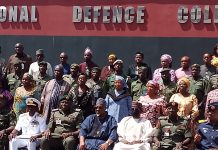By Tayo Alabi
A group, Socio-Economic Rights and Accountability Project and 24 concerned Nigerians have sued the regime of the President Muhammadu Buhari and the National Broadcasting Commission at the ECOWAS Community Court of Justice in Abuja.
According to SERAP the suit is over “the arbitrary use of the NBC Act and broadcasting code to target, harass, sanction, and fine independent television and radio stations in Nigeria, and to restrict Nigerians’ freedom of expression and access to information.”
Consequently, the group is asking the ECOWAS Court to declare “illegal and contrary to Nigeria’s international human rights obligations the provisions of the NBC Act and broadcasting code frequently apply by the Federal Government and NBC to target, harass, intimidate, and impose sanctions on independent television and radio stations in the country.”
In the suit number ECW/CCJ/APP/19/21 and filed last week, the Plaintiffs are arguing that “the rights to freedom of expression, access to information and media freedom allow Nigerians to seek and attain truth, which is an inherently good activity. These rights also allow Nigerians to participate in representative governance, social and political decision-making, which the Federal Government and NBC are obligated to foster and encourage.”
According to the Plaintiffs, “Attempts to justify restrictions on these fundamental rights and freedom on the overly vague grounds of incitement, morality and subversion of the constituted authority contradict the principles of the universality of human rights. Freedom of Expression is a fundamental human right and cannot be denied without lawful justification.”
The Plaintiffs are also arguing that “the application of the Nigerian Broadcasting Act 1992 and broadcasting code to sanction independent television and radio stations is arbitrary, and has created an environment in which independent media houses are censored, or resort to self-censorship.”
The Plaintiffs state that “despite the Freedom of Information Act in Nigeria which guarantees the right to access public records, the Federal Government and its agents and several states of Nigeria have routinely refused to release information sought.”
The Plaintiffs are also arguing that “a lot of Nigerians at home and abroad rely on independent television and radio stations including online on their coverage of topical issues of public interest to access impartial, objective and critical information about ideas and views on how the Federal Government and its agents are performing their constitutional and international human rights obligations.”
The suit filed on behalf of the Plaintiffs by their lawyers, Kolawole Oluwadare and Opeyemi Owolabi, read in part, “The low level of political tolerance for views perceived to be critical of government or offensive means that the press continues to be subject of scare tactics, harassment and intimidation.”
“Censorship restricts the flow of information from the Federal Government and its agents about issues of public interest, preventing people from accessing critical information, expressing themselves, and denying them opportunities to assert other fundamental human rights.”
“It also violates the rights of people to openly discuss issues relating to transparency and accountability in government, and prevents them from accessing information on a wide range of related concerns.”
“The Federal Government and NBC should be stopped from using the broadcasting code or any other regulations and/or law to erode the sacred rights to freedom of expression, information and media freedom, which is the bedrock of the rule of law and sustainable democracy.”
The group said no date has been fixed for the hearing of the suit.













